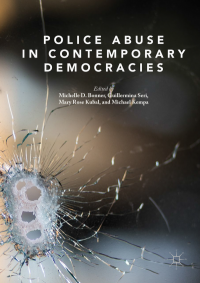Michelle Bonner
On August 9, 2014, 18-year-old Michael Brown was fatally shot by a police officer in Ferguson, Missouri. He was suspected of petty theft but was unarmed. A subsequent trial found the officer’s actions to be justified as self-defense. Despite the institutions of democracy working as they are designed, large protests (themselves met with police repression and arrests) registered profound public disagreement with the outcome. For many protesters this was one example, among numerous others, of police abuse aimed at African Americans that undermines their inclusion in American democracy.
Such powerful disagreements are not unique to democracy in the United States. Abuse of police authority happens in all democracies. It can include arbitrary arrest, selective surveillance and crowd control, harassment, sexual assault, torture, killings, or even forced disappearances. In newer democracies, police abuse is often thought to be a legacy of a previous authoritarian regime or civil war. Its persistence is understood to reflect weak democratic institutions and poorly functioning police forces. In established democracies, police abuse is more often thought to be an exception that is easily addressed through existing or tweaked institutions of accountability, such as the judiciary. Yet, as we argue in Police Abuse in Contemporary Democracies, police abuse has more significant implications for all democracies. We examine three. 
Citizenship. Democracy includes the exercise and protection of rights for all citizens. This includes the right to protest, to mobility and not to be arbitrarily arrested or tortured. Rather than the courts, police are the first state actors to decide when citizen rights are protected and when they are ignored. They also have a great deal of discretion to decide who are (potential) wrongdoers and how much force to use to confront them. Marginalized groups in many countries find that it is in fact the police who determine the boundaries of their rights as citizens. Not all citizens’ rights are protected in the same way, creating pockets of authoritarian rule within democracy.
Some citizens, based on their identity, find, for example, that police watch them more closely, will arbitrarily arrest them for being in the “wrong place”, and police are more likely to mistreat them during arrest or while they are held in custody. This is particularly true for those who are economically poor (we examine cases from India, Brazil, Chile, Argentina, and South Africa). It also includes racialized minority groups such as Arabs in France or Blacks in France, South Africa and the United States (cases examined in the book). It can also include those who hold political views considered “radical” such as alter-globalization activists in Canada or those protesting or striking against neoliberal economic polices in South Africa (also examined in the book). That is, police abuse creates an unequal experience of democracy as it pertains to citizenship rights. To change this, we argue that we need to better understand how police use their discretion, why they profile some citizens over others, and the consequences of police profiling on the quality of democracy for all citizens. Another answer would be to strengthen police accountability.
Accountability. At first glance it might appear, at least in established democracies, that we already have the answer to reducing police abuse. If police abuse their power then they will be held accountable by the judiciary. This is an important feature of liberal democracy. Yet, the studies in our book reveal that in fact, in many countries (we examine the US, Chile, and to a lesser extent Argentina and India) the judiciary tends to be very lenient with police abuse.
Police have the right in a democracy to use violence. As the case of Michael Brown highlights, right and wrong is determined by the willingness of the judiciary to accept the justification provided by the police officer for his or her action (or inaction). In the case of Michael Brown, the office claimed he killed in self-defense and the courts accepted this justification as valid. As our chapters on Chile and the United States reveal, judicial accountability is often very sensitive to the need for police to maintain a good public image. So police wrongdoing is frequently blamed on an individual officer, a “bad apple”, or the judiciary accepts the officer’s justification in order to reinforce the power of all officers’ to respond as they see fit to different situations.
Of course, as in the Michael Brown case, the public can voice their disagreement with the judiciary. Yet, as one chapter on the US shows, whether or not the public perceives that the police have abused their powers and whether or not they demand judicial accountability is influenced by unconscious racial bias. To overcome these biases and the reluctance on the part of the judiciary to punish the police, another chapter suggests we need to encourage and support a wide variety of grassroots organizations, like Cop Watch, that are dedicated to keeping an eye on police conduct. All the authors agree that the answers to reducing police abuse lie beyond judicial or institutional police reforms. Tweaking institutions is not enough to reduce police abuse.
Socioeconomic Inequality. Finally, most studies of democracy argue that a certain level of socioeconomic equality is needed to sustain it. High levels of inequality of wealth weaken democracy. Political economists, including those in the World Bank, agree that neoliberal economic policies increase inequality in wealth. Yet, to ensure the implementation and protection of neoliberal economic policies, many governments rely on police abuse targeted against those who either oppose these policies or who are excluded from the economic model.
Our chapters on South Africa and Canada reveal repressive police responses to protests and strikes against neoliberal economic policies. Our chapters on France, South Africa, the United States, and Brazil all document government official’s encouragement of police abuse as the appropriate response to rising crime; preventive socioeconomic programmes, shown to better reduce crime, run counter to neoliberal economic policies. For example, in Brazil, state officials have drawn from international experience to establish Pacification Police Units (UPPs). UPPs occupy favelas (shantytowns) in large numbers in order to control crime, opening up opportunities for police abuse. Indeed, globally, with the spread of neoliberal economic policies, we have seen the rise of tough on crime rhetoric and policies in many countries. From this perspective, if we want to reduce police abuse, it is important to consider how some models of political economy might be more compatible with democracy than others.
To conclude, most people associate police abuse with authoritarian regimes. Yet, it occurs in all democracies and, if not checked, can reduce or even erode democracy. While in our book we examine three key ways police abuse affects democracy, there are many other ways it can do so, such as impacting elections, public policy, and or the construction of political ideologies. Given the global decline of democracy noted by academics and international organizations, such as Freedom House, it is important that we begin to ask how we can better address police abuse and the fuzzy line between democracy and authoritarianism that it represents.

(Michelle Bonner is Professor of Political Science in the Department of Political Science at the University of Victoria. Among other publications, she is the co-editor of Police Abuse in Contemporary Democracies (with Guillermina Seri, Mary Rose Kubal, and Michael Kempa) In addition to the editors, contributors to the volume include Marlea Clarke, Cathy Lisa Schneider, Christian Davenport, Rose McDermott, David Armstrong, Leonard Feldman, Rosa Squillacote, Francis Dupuis-Déri, Jinee Lokaneeta, and Markus-Michael Müller.)